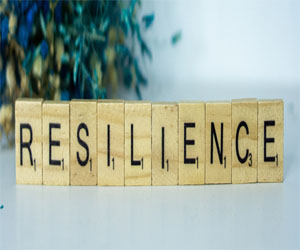


The Transformative Power Of Thankfulness

In the fast-paced and often stressful world we live in, nurturing our mental well-being is of paramount importance. A simple yet profound practice that can significantly contribute to our mental health is gratitude. The act of recognizing and appreciating the positive aspects of life, even in the face of challenges, has been proven to have a transformative impact on our mental well-being.
Gratitude is more than just saying "thank you" or acknowledging polite gestures. It involves a deep and mindful appreciation for the things, experiences, and people in our lives that bring us joy, comfort, and happiness. Here's how gratitude is closely linked to mental well-being and why it's worth incorporating into our daily lives.
Reducing Stress And Anxiety: Gratitude has the remarkable ability to reduce stress and anxiety levels. When we focus on the positive aspects of our lives, we counteract the effects of stress hormones, which can lead to improved mental and emotional health. Gratitude shifts our attention away from worry and uncertainty, promoting a sense of calm and relaxation.
Boosting Positivity: A gratitude practice helps us develop a more positive mindset. It encourages us to look for the silver lining in challenging situations and embrace a glass-half-full perspective. This positive outlook not only uplifts our mood but also enhances our overall mental well-being.
Enhancing Self-Esteem: Expressing gratitude for our accomplishments and personal growth can boost our self-esteem. When we acknowledge our achievements, no matter how small, it reinforces our sense of self-worth. This, in turn, contributes to improved mental health and a more positive self-image.
Fostering Resilience: Gratitude is a tool that can help us bounce back from setbacks and adversity. By finding things to be thankful for even in challenging times, we build emotional resilience. This allows us to face life's difficulties with greater strength and adaptability.
Strengthening Relationships: Gratitude is not limited to self-reflection; it also extends to our relationships with others. Expressing appreciation and thankfulness toward friends, family, and colleagues fosters deeper and more meaningful connections. These relationships provide a vital support system for maintaining mental well-being.
Promoting Mindfulness: Gratitude encourages us to be present in the moment and notice the beauty and goodness around us. This practice aligns with mindfulness, a powerful tool for mental health. By being fully engaged in the present and appreciating it, we reduce rumination and promote a more peaceful state of mind.
To incorporate gratitude into your daily life and enhance your mental well-being, consider starting a gratitude journal. Each day, write down three things you are thankful for. They can be simple, such as a delicious meal or a friendly conversation, or more profound, like the support of a loved one. The act of recording these positive aspects of your life can be a source of happiness in itself.
Gratitude and mental well-being are intrinsically linked. By practicing gratitude, we can reduce stress and anxiety, boost positivity, enhance self-esteem, foster resilience, strengthen relationships, and promote mindfulness. It is a simple yet powerful practice that can significantly improve our mental health and overall quality of life. In a world full of challenges, cultivating gratitude is a valuable tool for maintaining and enhancing our mental well-being.
Maximizing Your Kitchen Productivity
 3. Multi-Task
3. Multi-Task
Efficient cooking often involves multi-tasking. While one dish is simmering, you can be chopping ingredients for the next one. Just be sure to keep an eye on what's cooking to prevent burning or overcooking.
4. Use Kitchen Appliances
Kitchen appliances like food processors, blenders, and slow cookers can save you a lot of time and effort. Food processors can quickly chop, slice, and shred vegetables, while slow cookers allow you to prepare meals in the morning and return to a ready dinner in the evening.
5. Cook In Batches
Cooking efficiency is all about making the most of your time. When preparing meals, consider making extra portions. Leftovers can be used for future meals, eliminating the need to cook from scratch every day.
6. Embrace One-Pot And Sheet Pan Meals
One-pot and sheet pan meals are a time-saving marvel. They involve cooking an entire meal in a single pot or on a single sheet pan, minimizing cleanup and simplifying the cooking process.
7. Time-Saving Ingredients
Choose ingredients that are quick to cook or require minimal preparation. For example, opt for boneless, skinless chicken breasts over whole chickens, or use canned beans instead of dried ones that require soaking and long cooking times.
8. Learn Quick Cooking Techniques<
Mastering fast cooking techniques like stir-frying, sautéing, and pan-searing can help you prepare meals in minutes. These methods are not only efficient but also help retain the flavor and nutrients in your food.
A Holistic Approach To A Fulfilling Life
 Key Components Of Overall Well-Being
Key Components Of Overall Well-Being
Physical Health: A fundamental aspect of overall well-being, physical health encompasses nutrition, exercise, sleep, and the management of chronic conditions. Taking care of your body through regular physical activity and a balanced diet is essential for optimal well-being.
Mental Health: Mental well-being involves emotional stability, resilience, and a positive mindset. It's the ability to cope with stress, maintain healthy relationships, and find purpose and meaning in life.
Emotional Health: Emotional well-being relates to understanding and managing your emotions. It involves recognizing and expressing feelings, as well as developing strategies to handle emotional challenges.
Social Connections: Building and maintaining meaningful relationships with friends, family, and the community is a key component of overall well-being. A strong support system contributes to happiness and provides a safety net during difficult times.
Financial Stability: Financial well-being is the ability to manage and plan for financial security, reducing stress and enabling individuals to focus on other aspects of life.
Career And Personal Development: A fulfilling career and personal growth contribute to overall well-being. Setting and achieving personal and professional goals can enhance one's sense of purpose and satisfaction.
Nurturing Overall Well-Being
Balanced Lifestyle: Strive for a balanced lifestyle by making time for work, relaxation, and leisure activities. Allocate time for exercise, hobbies, and activities that bring you joy.
 Mindfulness Meditation: One of the most effective ways to find tranquility is through mindfulness meditation. This ancient practice encourages individuals to be fully present in the moment, without judgment. By focusing on their breath and observing their thoughts and emotions, people can achieve a state of calm and serenity. Even just a few minutes of mindfulness meditation each day can provide a sense of tranquility and a break from the daily hustle.
Mindfulness Meditation: One of the most effective ways to find tranquility is through mindfulness meditation. This ancient practice encourages individuals to be fully present in the moment, without judgment. By focusing on their breath and observing their thoughts and emotions, people can achieve a state of calm and serenity. Even just a few minutes of mindfulness meditation each day can provide a sense of tranquility and a break from the daily hustle.
Nature Retreats: Nature has a remarkable ability to soothe the mind and replenish the soul. Taking a break from the stress-filled world to spend time in nature can be a profound source of tranquility. Whether it's a walk in the woods, a day at the beach, or simply sitting in a park, connecting with nature can offer a sense of peace that is hard to find elsewhere.
Digital Detox: The constant connectivity to technology can be a significant source of stress. Taking time for a digital detox, where you disconnect from your devices and immerse yourself in the offline world, can be a refreshing way to find tranquility. It allows you to be fully present in your surroundings and engage in meaningful, real-world interactions.
Simplicity And Minimalism: Sometimes, simplifying your life and embracing minimalism can lead to tranquility. Reducing clutter in your physical space and streamlining your commitments can create a sense of calm. It allows you to focus on what truly matters, eliminating unnecessary stressors.
Yoga And Breathwork: Yoga combines physical movement with breath control, promoting relaxation and inner peace. It not only improves physical flexibility but also calms the mind. Incorporating yoga and breathwork into your routine can help you find tranquility in the midst of chaos.
Art And Creativity: Engaging in creative activities such as art, writing, or music can be therapeutic. These activities offer an escape from the stress-filled world, allowing you to express your emotions and find tranquility through creative self-expression.
A Lifelong Journey To Wellness
 Sustainability: Short-term solutions and crash diets often result in temporary improvements, followed by relapses. Long-term health is sustainable, promoting consistent well-being that lasts a lifetime.
Sustainability: Short-term solutions and crash diets often result in temporary improvements, followed by relapses. Long-term health is sustainable, promoting consistent well-being that lasts a lifetime.
Quality Of Life: Long-term health is not just about living longer but living better. It ensures that you can enjoy life to the fullest, with the physical and mental vitality to pursue your interests and passions.
Reduced Healthcare Costs: By investing in long-term health, you can potentially reduce healthcare costs associated with the treatment of chronic illnesses, doctor visits, and medications.
Investing In Long-Term Health
Balanced Diet: A diet rich in nutrient-dense foods is the foundation of long-term health. Emphasize fruits, vegetables, whole grains, lean proteins, and healthy fats. Minimize processed foods, added sugars, and excessive salt.
Regular Physical Activity: Incorporate regular exercise into your routine. Engage in a mix of aerobic, strength, and flexibility exercises to promote overall physical well-being.
Mental Health: Prioritize your mental health by managing stress, practicing mindfulness, and seeking support when needed. Mental well-being is as crucial as physical health for long-term wellness.
Preventive Healthcare: Schedule regular check-ups and screenings to catch potential health issues early. Preventive healthcare measures can help you address concerns before they become significant problems.
Sleep And Rest: Ensure you get sufficient quality sleep, as restorative rest is crucial for overall well-being. Maintain a consistent sleep schedule to support your body's natural rhythms.
 The Quest For Inner Harmony: Inner harmony is a state of balance and tranquility that emerges when our inner thoughts, emotions, and reactions are aligned with our deepest values and desires. Achieving inner harmony is not about eliminating external stressors but rather about developing resilience and a calm center that remains steadfast even in the midst of life's challenges.
The Quest For Inner Harmony: Inner harmony is a state of balance and tranquility that emerges when our inner thoughts, emotions, and reactions are aligned with our deepest values and desires. Achieving inner harmony is not about eliminating external stressors but rather about developing resilience and a calm center that remains steadfast even in the midst of life's challenges.
How Mindfulness Cultivates Inner Harmony:
Self-Awareness: Mindfulness begins with self-awareness. By paying attention to our thoughts, feelings, and sensations, we gain insight into our inner world. This self-awareness helps us recognize harmful patterns, emotional triggers, and areas where we may be out of balance.
Emotional Regulation: Mindfulness promotes emotional regulation by encouraging us to observe our emotions without judgment. This non-reactive awareness allows us to respond to challenging situations with equanimity and emotional balance.
Reduced Stress: The practice of mindfulness triggers the relaxation response in our bodies, reducing the impact of stress on our minds and emotions. This leads to greater calm and harmony within.
Improved Resilience: Mindfulness helps us bounce back from adversity. By fostering a positive outlook on life, it allows us to view difficulties as opportunities for growth rather than insurmountable obstacles.
Enhanced Relationships: By being fully present in our interactions, mindfulness can deepen our connections with others, fostering empathy, compassion, and a more harmonious way of relating to those around us.
Incorporating Mindfulness Into Daily Life:
Start Small: You don't need to spend hours meditating to experience the benefits of mindfulness. Begin with short, daily practices, such as mindful breathing or mindful eating, and gradually expand from there.